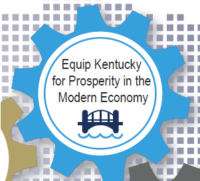 Equipping Kentucky for prosperity in the modern economy is one of the five key strategies in “An Economic Agenda for a Thriving Commonwealth.” Our location, geography and climate make us a great state in which to live and do business. By investing in infrastructure, we can build upon and steward these assets, better support economic activity and increase the quality of life for all Kentuckians. We can also take advantage of creative financing solutions and put more people to work improving our commonwealth. By strengthening the very building blocks of our communities, we can unleash our economic potential.
Equipping Kentucky for prosperity in the modern economy is one of the five key strategies in “An Economic Agenda for a Thriving Commonwealth.” Our location, geography and climate make us a great state in which to live and do business. By investing in infrastructure, we can build upon and steward these assets, better support economic activity and increase the quality of life for all Kentuckians. We can also take advantage of creative financing solutions and put more people to work improving our commonwealth. By strengthening the very building blocks of our communities, we can unleash our economic potential.
And yet across the commonwealth, falling behind on investments in our infrastructure makes life and work more difficult, expensive and dangerous. Too often, one’s location within Kentucky determines whether there is access to clean water, affordable electricity and internet, and safe and accessible roads and bridges. The policy ideas below will help ensure that all people and businesses in Kentucky can access the public goods that make life and work in our state possible.
Achieve Universal, Affordable Broadband Internet Access
The internet is essential for communicating in the modern world, but many Kentucky communities are struggling to access and maintain adequate connections. The state can support access to broadband across the commonwealth by completing the Kentucky Wired project in a timely manner, and where feasible cutting inappropriate private sector profiteering that was unwisely built into the project. Kentucky must also support affordable last-mile broadband access in local communities across the state by assisting the public provision of that service. Municipal services already exist in Glasgow, Frankfort and other cities, and through rural cooperatives like the People’s Rural Telephone Cooperative in Jackson and Owsley counties.
Accelerate the Transition to Clean Power
Clean, renewable energy and increased energy efficiency can diversify our grid, improve air and water quality, create jobs and achieve energy savings. Kentucky should join 29 other states in establishing a Renewable Portfolio Standard and expanded energy efficiency measures to support a transition to more sustainable energy sources, create economic benefits from new industries and lower energy use. Research suggests that Kentucky can begin a meaningful transition by requiring utilities to provide 25 percent of electricity from renewable sources within 15 years and achieve a cumulative 17 percent in savings from energy efficiency improvements.
Invest in Roads and Bridges
Kentucky needs funding to modernize and improve its road and bridge infrastructure. The list of projects for which there is no funding has increased due to anemic Road Fund revenues caused by a drop in Kentucky’s gas tax rate, a recent new exemption from the motor vehicle usage tax for trade-in vehicles, and a lack of federal funding for infrastructure. According to one estimate, the state has more than 1,100 structurally deficient bridges and more than 3,700 miles of roads that need significant repairs. The backlog of needed pavement improvements alone totals approximately $1 billion and is growing at a rate of 500 miles of roadway each year. Road and bridge improvements facilitate growth in our economy, increase safety and reduce what Kentuckians spend on automobile repair. Furthermore, putting Kentuckians to work rebuilding these structures can help provide jobs, especially in economically distressed regions.
Upgrade Kentucky’s Water Infrastructure
Kentucky’s drinking water infrastructure needs are estimated at $6.2 billion over the next 20 years according to the American Society of Civil Engineers, and the state faces significant waste-water needs. Ranking 4th in the U.S. for miles of inland waterways, Kentucky has an outdated dam infrastructure and needs improvement in water quality through stream protection and restoration. Through increased investments, we could put people to work on improvements that would enhance public health and the state’s natural beauty and ecological integrity.
Expand Low-Cost Financing Options
Kentucky residents, businesses and governments would benefit from tools to finance investments and limit the cost of debt while keeping more dollars circulating within the state. Two important needs are to reduce the cost of student loans — now totaling $16.2 billion in Kentucky — and to avoid unnecessary public borrowing costs stemming from the state’s now-low bond rating. Kentucky should examine the potential for a state bank, as has operated successfully in North Dakota for a hundred years. The Bank of North Dakota partners with community banks to expand financing options, directly provides low-cost alternatives for financing needs like student loans and community infrastructure, and actually sends revenue back to the state’s General Fund.


